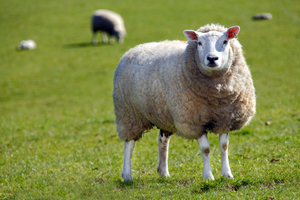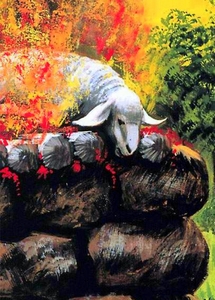 Scripture tells us that heaven and earth glorify G-d.
Scripture tells us that heaven and earth glorify G-d.
The heavens are telling of the glory of God; and their expanse is declaring the work of His hands. (Psalm 19:1)
And one called out to another and said, "Holy, Holy, Holy, is the LORD of hosts, The whole earth is full of His glory." (Isaiah 6:3)
Within creation, each created thing serves to glorify its Creator in its own unique way. In addition to the unique way in which G-d is glorified, there are varying degrees of glory and holiness can be revealed. For a simple example, let’s consider a sheep.
Sheep
The sheep can live its life as a sheep normally does: it is born, it bleats, it eats, it sleeps, it does other normal sheep-like things, and then it dies.
Everything about that sheep (from its biochemical and physiological complexity, its ability to regenerate damaged cells and reproduce, etc) and the environment required to support its life (gravity, atmosphere, grass, water, etc)... all of these declare G-d’s unfathomable greatness as the Creator. This revelation of G-d's glory is part of G-d’s purpose for the sheep.
G-d has also provided a means for the sheep to be elevated above its “common” existence to something of greater purpose: a sacrifice.
 Sacrifice
Sacrifice
That exact same sheep can be taken and, in accordance with G-d’s instructions, can be made into a sacrifice. As a sacrifice, the sheep glorifies G-d to a greater degree by its greater holiness and its greater function of its role in the relationship between G-d and man.
The animal is part of G-d’s creation whether it serves as a sheep or a sacrifice. The animal dies whether it serves as a sheep or a sacrifice. But it is only as a sacrifice that the animal is elevated in purpose and action beyond the "common" to the "holy" (Leviticus 6:25): it pictures the sacrificial work of its Creator: the Messiah Yeshua.
The sheep, however, cannot choose to become a sacrifice. That decision is made by people rather than the animal itself. The Levites never saw sheep rushing and lining up to be selected as a sacrifice thinking "oh, oh, pick me! Pick me!"
Living Sacrifices
In his letter to the believers in Rome, Paul exhorts his readers:
Therefore I urge you, brethren, by the mercies of God, to present your bodies a living and holy sacrifice, acceptable to God, which is your spiritual service of worship. (Romans 12:1)
Paul urges (but does not require) his audience to present their bodies as a living and holy sacrifice. He informs his readers that there is something greater that their lives can accomplish.
Let’s consider this idea for a moment using our sheep concept above.
The believer can live his life as a human normally does: he is born, he talks, he eats, he sleeps, he does other, normal human-like things, and then he dies. Just like the sheep, the fact that he even exists serves to glorify G-d. This requires no unique effort on the part of the believer.
By simply "being", the believer glorifies G-d.
... or ...
The believer can elevate his life beyond the mundane, common human existence into a living and holy sacrifice.
There are two important differences between the believer and the sheep:
a) the believer is allowed a choice whether to be a sacrifice or not and
b) the believer doesn’t have to physically die to perform his spiritual service of worship.
By "doing", the believer elevates himself above simply "being" and glorifies G-d in a service of worship.
What should we do?
Was Paul referring to anything a believer does as "service of worship"? The answer is clearly "no". As an example, some people in Corinth were involved with pagan temple prostitutes and Paul indicates their choice of "worship" is sin (1 Corinthians 6:18).
There are also many things a believer can do that would not differ from actions performed as part of everyday living. That is simply "being"… like the sheep.
There are, however, acts of holiness that G-d has commanded in His Word that believers can perform in elevating themselves from "sheep" to "sacrifice" and it is in the doing that we accomplish this. So what things has G-d commanded?
There are some key words that help us find these acts of holiness:
For I am the LORD your God. Consecrate yourselves therefore, and be holy, for I am holy. (Leviticus 11:44)
For I am the LORD who brought you up from the land of Egypt to be your God; thus you shall be holy, for I am holy. (Leviticus 11:45)
Speak to all the congregation of the sons of Israel and say to them, ‘You shall be holy, for I the LORD your God am holy. (Leviticus 19:2)
You shall consecrate yourselves therefore and be holy, for I am the LORD your God. (Leviticus 20:7)
Thus you are to be holy to Me, for I the LORD am holy; and I have set you apart from the peoples to be Mine. (Leviticus 20:26)
...so that you may remember to do all My commandments and be holy to your God. (Numbers 15:40)
What types of instruction does G-d provide in these passages? These verses are embedded in G-d's commandments that enable us to transform our lives from sheep to sacrifice.
Leviticus 11
In Leviticus 11, G-d provides instruction regarding food. These laws are not given as matters of "health" but as matters of "holiness" as G-d concludes the chapter with the charge "be holy, for I am holy".
G-d takes one of the basic elements of our mundane, sheep-existence and gives us an opportunity to elevate the simple act of eating food and transform it into an act of sacrifice, holiness, and worship.
Leviticus 19 & 20
G-d begins chapter 19 with a call to holiness (be holy, for I the LORD your G-d am holy) and concludes in Leviticus 20:7 with that same call (be holy, for I am the LORD your G-d). In Leviticus 19, G-d provides instruction about relationships. Taken individually, the collection of commandments contained in chapter 19 seems like a hodge-podge of do's and don'ts. If we step back and look at the "big picture" we find the common thread of this tapestry is relationships.
As in Leviticus 11, G-d takes one of the basic elements of our mundane, sheep-existence and provides an opportunity for us to elevate our relationships and transform them into elements of sacrifice, holiness, and worship:
- with our parents (every one of you shall reverence his father and mother- Lev 19:3)
- with the poor (you shall leave them for the needy- Lev 19:9-10)
- with our neighbors (You shall not oppress your neighbor, nor rob him- Lev 19:13)
- with those who have disabilities (You shall not curse a deaf man, nor place a stumbling block before the blind- Lev 19:14)
- with the land where we live (When you enter the land and plant all kinds of trees for food- Lev 19:23)
- with our children (do not profane your daughter by making her a harlot- Lev 19:29)
- etc
Numbers 15
In Numbers 15, G-d provides instruction regarding clothing. This commandment is not given as a matter of "fashion" but as matters of "holiness" as G-d once again concludes the chapter with the charge "be holy to your G-d".
Once more we find that G-d takes one of the basic elements of our mundane, sheep-existance and provides us with an opportunity to elevate the simple act of wearing clothing and transform it into an act of sacrifice, holiness, and worship.
The LORD also spoke to Moses, saying, "Speak to the sons of Israel, and tell them that they shall make for themselves tassels on the corners of their garments throughout their generations, and that they shall put on the tassel of each corner a cord of blue. It shall be a tassel for you to look at and remember all the commandments of the LORD, so as to do them and not follow after your own heart and your own eyes, after which you played the harlot, so that you may remember to do all My commandments and be holy to your God. I am the LORD your God who brought you out from the land of Egypt to be your God; I am the LORD your God." (Numbers 15:37-41)
This instruction regarding the "tassels" (called tzitzit in Hebrew) is yet another way that G-d enables us to choose whether to live our lives as a sheep or as a sacrifice. You can learn more about tzitzit here.
Conclusion
The conclusion, when all has been heard, is: fear God and keep His commandments, because this applies to every person. (Ecclesiastes 12:13)
In G-d's abundant mercy, He provides believers with the opportunity to choose and glorify Him in ways that transform our lives from a "sheep" to a "sacrifice". He does not set forth monumental or unattainable requirements like "come up with a cure for cancer" or "solve the problem of hunger in the world". He takes the basic elements of our lives like eating, relationships, and clothing and says, "choose to do it My way and you will glorify Me".
Let us conclude by considering the words of Joshua:
"If it is disagreeable in your sight to serve the LORD, choose for yourselves today whom you will serve: whether the gods which your fathers served which were beyond the River, or the gods of the Amorites in whose land you are living; but as for me and my house, we will serve the LORD." (Joshua 24:15)
<><